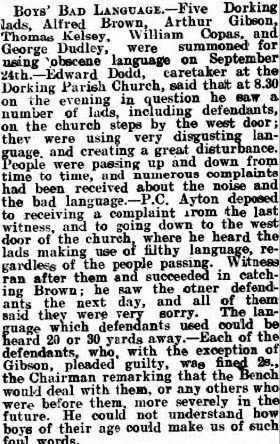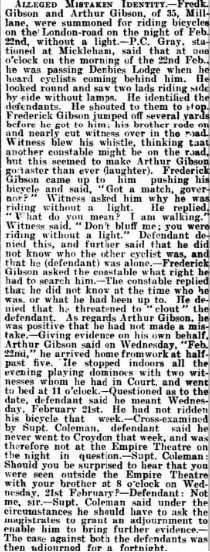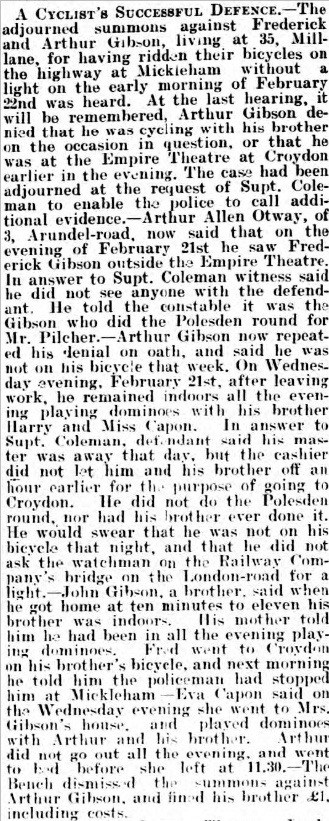Thank you to Jane Anthony for the following research.
Given that Arthur Gibson was both a Company Sergeant Major and was awarded the Military Medal it was surprisingly difficult to find any information about him or, indeed what connection he had to Dorking. However luck would have it that reports from the Dorking Advertiser mentioned someone of that name being up before the magistrates in both 1907 and 1912.
The Gibson family were peripatetic. Both of Arthur’s parents; John and Julia; were born in Stoke Newington where they married, and their oldest two sons John and Henry were born. By the time Arthur was born in 1892 they had moved to Fulham, another son Frederick was also born there. By 1901 they had moved to Brighton where a fifth and final son Claud was born. John Gibson was a fish packer, and both the older two boys were working as porters in local shops. John died in 1907 aged 42, leaving Julia to bring up her five sons single handedly. By 1911 the family had moved to 35 Mill Lane, Dorking. The head of the household was John, the eldest son, now 28 and working as a furniture packer, Arthur’s mother Julian and his two younger brothers Frederick and Claud are still living at home but there is no trace of either Arthur or Henry. It is probable that Arthur had already joined the Army at this stage as Private Arthur Gibson, born in 1892 at Fulham is listed as being at the Woolwich barracks of the 6th Battalion Kings Own Rifles.

Boys Bad Language
Five Dorking lads, Alfred Brown, Arthur Gibson, Thomas Kelsey, William Copas, and George Dudley, were summoned for using obscene language on September 24th. Edward Dodd, caretaker at the Dorking Parish Church, said that at 8.30 on the evening in question he saw a number of lads, including defendants, on the church steps by the west door; they were using very disgusting language and creating a great disturbance. People were passing up and down from time to time, and numerous complaints had been received about the noise and the bad language. PC Ayton deposed to receiving a complaint from the last witness, and to going down to the west door of the church, where he heard the lads making use of filthy language regardless of the people passing. Witness ran after them and succeeding in catching Brown; he saw the other defendants the next day, and all of them said they were very sorry. The language which defendants used could be heard 20 or 30 yards away. Each of the defendants who, with the exception of Gibson, pleaded guilty, was fined 2s. the Chairman remarking that the Bench would deal with them, or any others who were before them, more severely in the future. He could not understand how boys of their age could make use of such foul language.
Arthur Gibson Court Report © Dorking Advertiser findmypast
Prior to joining the army Arthur seems to have possibly been a bit of a trouble maker. On September 1906, only a few months after the death of his father in Brighton, he was one of a group of five boys, including William Copas, who were caught using bad language and making a disturbance outside Dorking Parish Church. All, except Gibson, apologised and pleaded guilty; they were fined 2 shillings. There is no mention of what punishment Arthur Gibson received.

ALLEGED MISTAKEN IDENTITY – Fredk Gibson and Arthus Gibson of 35 Mill Lane, were summoned for riding bicycles on the London Road on the night of Feb. 22nd, without a light. P.C. Gray stationed at Mickleham, said that at one o’clock on the morning of the 22nd Feb, he was passing Denbies Lodge when he heard cyclist coming behind him. He looked round and saw two lads riding side by side without lamps. He identified the defendants. He shouted to them to stop. Frederick Gibson jumped off several yards before he got to him; his brother rode on and nearly cut witness over in the road. Witness blew his whistle, thinking that another constable might be on the road, but this seemed to make Arthur Gibson go faster than ever (laughter). Frederick Gibson came up to him pushing his bicycle and said “Got a match governor?” Witness asked him why he was riding without a light. He replied “What do you mean? I am walking.” Witness said “Don’t bluff me, you were riding without a light.” Defendant denied this, and further said he did not know who the other cyclist was, and that he (defendant) was alone. Frederick Gibson asked the constable what right he had to search him. The constable replied that he did not know at the time who he was, or what he had been up to. He denied that he threatened to ‘clout’ the defendant. As regards Arthur Gibson, he was positive he had not made a mistake. Giving evidence on his own behalf, Arthur Gibson said on Wednesday “Feb 22nd” he arrived home at half past five. He stopped indoors all the evening playing dominoes with two witnesses who he had in court, and went to bed at 11 o’clock. Questioned as to the date, defendant said he meant Wednesday February 21st. He had not ridden his bicycle that week. Cross examined by Supt. Coleman, defendant said he never went to Croydon that week, and was therefore not at the Empire Theatre on the night in question. Supt. Coleman “Should you be surprised to hear that you were seen outside the Empire Theatre with your brother at 8 o’clock on Wednesday 21st February? Defendant : Not me, Sir. Supt Coleman said under the circumstances he should have to ask the magistrates to grant an adjournment to enable him to bring further evidence. The case against both of the defendants was then adjourned for a fortnight.

A CYCLIST’S SUCCESSFUL DEFENCE
The adjourned summons against Frederick and Arthur Gibson, living at 35 Mill Lane, for having ridden their bicycles on the highway at Mickleham without a light on the early morning of February 22nd was heard. At the last hearing, it will be remembered, Arthur Gibson denied that he was cycling with his brother on the occasion in question, or that he was at the Empire Theatre at Croydon earlier in the evening. The case had been adjourned at the request of Supt. Coleman to enable the police to call additional evidence. Arthur Allen Otway of 3 Arundel Road, now said that on the evening of February 21st, he saw Frederick Gibson outside the Empire Theatre. In answer to Supt. Coleman witness said he did not see anyone with the defendant. He told the constable it was the Gibson who did the Polesden round for Mr. Pilcher. Arthur Gibson now repeated his denial on oath, and said he was not on his bicycle that week. On Wednesday evening, February 21st, after leaving work, he remained indoors all the evening playing dominoes with his brother Harry and Miss Capon. In answer to Supt. Coleman, defendant said his master was away that day, but the cashier did not let him and his brother off an hour earlier for the purpose of going to Croydon. He did not do the Polesden Lacey round, nor had his brother ever done it. He would swear that he was not on his bicycle that night, and that he not ask the watchman on the Railway Company’s bridge on the London Road for a light. John Gibson, a brother, said when he got home at ten minutes to eleven his brother was indoors. His mother told him he had been in all evening playing dominoes. Fred went to Croydon on his brother’s bicycle, and next morning he told him the policeman had stopped him at Mickleham. Eva Capon said on the Wednesday evening she went to Mrs. Gibson’s house, and played dominoes with Arthur and his brother. Arthur did not go out all the eveningm and went to bed before she left at 11.30. The Bench dismissed the summons against Arthur Gibson, and fined his brother £1. including costs.
Arthur Gibson Court Report © Dorking Advertiser findmypast
Another run in with the police occurred in 1912, by this date Arthur must have left the army as in his evidence he talks of returning home from work. Arthur and his brother Frederick were stopped by the police for the heinous crime of riding their bikes without lights. Frederick stopped and denied that he has riding the bike but claimed to be pushing it, however Arthur denied that he had been riding his bike but was at home playing dominoes. The case was adjourned for a fortnight, when further witnesses, including his brothers John and Harry, came forward to vouch for him. Frederick was fined £1 but Arthur was acquitted.
Presumably he rejoined his old regiment when war was declared in 1914; it was usually a condition when regular army recruits left either after they had left or had bought themselves out. He enlisted in the 10th Battalion Kings Rifle Corps which was formed, as part of Kitcheners Army, on 14th September 1914 at Winchester. As a former regular soldier Gibson must have been an obvious candidate for promotion for a non-commissioned officer. After several deployments for training the battalion arrived in France on 21 July 1915.
Arthur Gibson was killed on 2nd December 1917 at the Battle of Cambrai. This battle is famous as being the first where tanks were widely used. The attrition in this battle was very high with more than 40,000 casualties on both sides, one of which was Company Sergeant Major Arthur Gibson who was aged about 25 when he was killed. He has no known grave but is commemorated on the Cambrai Memorial.
His legatee was his wife Emily, it is not know when or where they married but as South Norwood was given as being his place of residence it must be assumed that they were living there after the marriage. Despite being awarded the Military Medal, reputedly more rarely awarded than the officers equivalent, the Military Cross, there is no citation or obituary available in contemporary newspapers.
| Born | Fulham, London | |
| Lived | Dorking, Surrey | |
| Son of | John and Julia Gibson of Mill Lane, Dorking | |
| Husband of | Emily Gibson | |
| Regiment | 10th Battalion, Kings Royal Rifle Corps | |
| Number | C/406 | |
| Date of Death | 2nd December 1917 | |
| Place of Death | Cambrai, France | |
| Cause of Death | Killed in Action | |
| Age | 25 | |
| Memorial | Cambrai Memorial, France |


